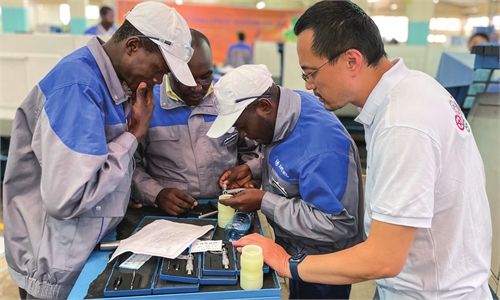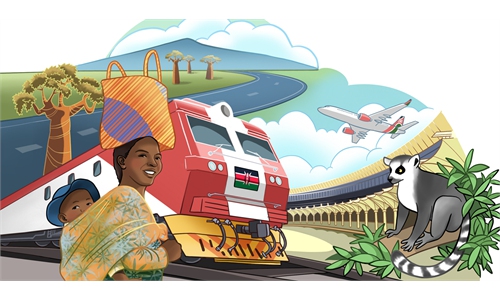Editor's Note:
Over the last decade, the Belt and Road Initiative (BRI) has yield fruitful achievements and greatly enriched China-Africa relations. As this year marks the 10th anniversary of the proposal of BRI, Global Times reporters Liu Xin and Xing Xiaojing (GT) interviewed Chinese Ambassador to Kenya Zhou Pingjian (Zhou) and Chinese Ambassador to Madagascar Guo Xiaomei (Guo), to learn about their views on the BRI's achievements in the two African countries and their expectations for future cooperation.

Guo Xiaomei, Chinese Ambassador to Madagascar Photo: Courtersy of the Chinese Embassy to Madagascar
GT: In recent years, China and Madagascar have achieved fruitful results in friendly cooperation in various fields, benefiting both peoples. What do you think the biggest achievements and highlights of China and Madagascar in jointly building the Belt and Road Initiative (BRI) are?
Guo: In March 2017, the heads of state of China and Madagascar witnessed the signing of the Memorandum of Understanding (MOU) on jointly promoting the construction of the Silk Road Economic Belt and the 21st Century Maritime Silk Road. Madagascar became one of the earliest African countries to sign a cooperation document on the BRI with China. Since then, the two countries have continuously achieved fruitful results in jointly building the BRI, benefiting both peoples.
First, it has added new impetus to friendly exchanges between the two countries. There have been frequent high-level interactions between the two countries. Second, the BRI has yielded abundant results in bilateral economic and trade cooperation. The initiative effectively connects with Madagascar's "Initiative Emergence Madagascar (IEM)" and "Plan for the Emergence of Madagascar," promoting the comprehensive development of bilateral economic and trade cooperation.
The scale of bilateral trade has grown rapidly. According to Chinese customs statistics, the bilateral trade volume reached $2.08 billion in 2022, an increase of 68.56 percent compared with 2017, with an average annual growth rate of over 10 percent. Among them, Madagascar's imports from China reached $1.455 billion, an increase of 44.49 percent compared with 2017, with an average annual growth rate of 7.6 percent. Madagascar's exports to China reached $625 million, an increase of 175.33 percent compared with 2017, with an average annual growth rate of over 20 percent.
Moreover, Chinese enterprises have become increasingly active in investing in Madagascar. Since 2017, Chinese-funded enterprises have initiated 16 new investment projects in Madagascar. Currently, there are more than 30 Chinese enterprises in Madagascar, mainly engaged in public works, manufacturing, agriculture, fisheries, telecommunications, hotels, and catering services. These enterprises have made positive contributions to employment, training, and industrial upgrading in Madagascar, promoting the economic and social development of Madagascar and achieving mutual benefit and win-win results.
Third, China's support for Madagascar's infrastructure construction has increased. China has carried out financing cooperation with Madagascar to support the construction of infrastructure in areas such as roads, electricity, and communications, enhancing the driving force for Madagascar's economic development. Projects such as the Ivato-Tsarasaotra Road to the Ivato International Airport, the expressway linking the Ivato International Airport and the Boulevard de l'Europe, the rehabilitation of RN5A, the modernization of communication networks, and Ranomafana hydroelectric power plant have all benefited from Chinese financing.
Fourth, the amount of engineering contracts undertaken by Chinese enterprises has significantly increased. In 2022, Chinese enterprises signed new contracts for projects in Madagascar worth $480 million, an increase of 47.2 percent compared with 2017, with an average annual growth rate of 8 percent; the completed turnover was $320 million, 2.4 times that of 2017.
The initiative has also made new contributions to improving local livelihoods. The project to aid the road construction on the fringes of the capital of Madagascar (also known as The Eggs Road) implemented with aid from China, has effectively improved the transportation of eggs in the egg-producing areas near the capital.
The satellite TV access project for 10,000 African villages, including 500 in Madagascar and the drilling of wells in the south, among other "small but beautiful" projects, have enriched cultural life in rural areas and improved water conditions for the people in the south.
The Chinese medical teams stationed in the capital and three other locations have saved lives and provided medical treatment and medicine in Madagascar. Chinese experts and Malagasy doctors jointly carried out the "Bright Journey" activity, restoring sight to more than 200 patients. When Madagascar suffered from natural disasters such as hurricanes, China took the initiative to extend a helping hand, providing timely assistance to help the country recover its normal production and life. The cooperation has effectively benefited people's livelihoods and won high praise from the Malagasy government and people.
GT: On June 29, in your article "Crossing Mountains and Seas toward the Future" published in the Chinese media outlet International Business Daily that you mentioned Chinese companies have responded actively to the initiative and have been investing more actively in Madagascar, creating a large number of jobs locally, could you please elaborate more on how the initiative has promoted economic and social development as well as employment in Madagascar, and development in other sectors?
Guo: Sound infrastructure is an important prerequisite for attracting investment and achieving development, and infrastructure construction is a key area of the IEM. Since the implementation of the BRI in Madagascar, a series of infrastructure construction cooperation projects implemented by China in Madagascar have provided important support for the economic and social development as well as the improvement of people's livelihoods in Madagascar.
One example is the completion of the 151.7-kilometer-long rehabilitation project of the RN5A in September 2022. Before the project, the RN5A was in disrepair and impassable due to mud, with a travel time of up to 12 hours during the dry season and two weeks or even impossible to commute on during the rainy season. After the project was completed with preferential loans provided by China, the entire journey now only takes 2.5 hours.
The northern region is an important production area for economic crops such as vanilla and sugarcane in Madagascar. Vanilla is a major export product and an important source of foreign exchange for the agricultural economy. As a key transportation artery connecting the east and west coasts of the northern region and a critical link in the northern ring road network, the rehabilitation of the RN5A has greatly facilitated the movement of people and goods between the east and west coasts of the northern region, alleviated transportation bottlenecks for agricultural products such as vanilla and sugarcane, and effectively promoted local economic development.
Another example is the Ranomafana hydroelectric power plant project. In April of this year, China and Madagascar signed a framework agreement for the project. China will provide preferential loans to support the construction of a 64MW hydropower station near the capital of Madagascar. This is the largest financing cooperation project between China and Madagascar since the establishment of diplomatic relations. After the completion of the project, it will alleviate power shortage in the capital region, ensure electricity supply for residents, play a key role in meeting the growing demand for industrial and commercial electricity, guarantee stable power supply, and promote industrialization and economic development.
Phase-I of the modernization of the communication network project, which was delivered in early 2023, has built a data center in Madagascar, improving the level of government e-governance and office efficiency. In the long run, the cloud services and fiber leasing functions of the project will bring sustained income to the Malagasy government, promote the development of the digital economy in Madagascar, and foster new economic growth drivers.
In addition to infrastructure projects, other economic and trade cooperation projects have also played a role in promoting economic and social development in Madagascar. For example, Chinese cashmere companies have invested in factories in Madagascar, employing up to 5,000 workers during peak production periods, creating a large number of jobs locally. Chinese agricultural companies have promoted hybrid rice cultivation in Madagascar, providing technical support for local farmers, which has been widely recognized by the Malagasy people and highly valued by the government. Chinese companies engaged in engineering contracting not only employ a large number of local workers but also focus on training technical workers and cultivating local engineers, enhancing local human resources capacity building, and so on. There are many such examples.
GT: How do people in Madagascar evaluate the BRI? Are there any remarks that impressed you the most? What role will the initiative continue to play in promoting economic and people-to-people exchanges in the future?
Guo: Various sectors in Madagascar generally welcome the BRI and believe that the cooperation between China and Madagascar under the BRI meets the development needs of Madagascar and truly achieves shared benefits.
Among them, President Rajoelina's high evaluation of the BRI has left a deep impression on me. President Rajoelina has sent letters to President Xi multiple times, praising the high compatibility between the BRI and Madagascar's desire for emergence.
He stated that China is a reliable and important partner for Madagascar's development, and Madagascar's determination and confidence in actively participating in the construction of the BRI will not change. In September 2022, President Rajoelina personally attended the inauguration ceremony of the rehabilitation project of RN5A and drove smoothly on the newly repaired road. He proudly cheered with the people, "bye bye g?dra!" (goodbye, mud!), expressing the joy of completely eradicating the "nightmare" the residents faced along the road.
The cooperative construction of the BRI has not only effectively promoted policy communication, trade facilitation, infrastructure connectivity, and financial integration, but also promoted people-to-people communication between China and Madagascar. The exchange and communication between the two sides have continued to expand, enhancing mutual understanding and friendship, and laying a solid foundation for friendly relations between the two countries.
Language is the bridge of communication, and culture is the bond of exchange. Language and cultural exchanges can illustrate the issue of promoting people-to-people communication. Currently, Madagascar has two Confucius Institutes and one Confucius Classroom, and Chinese language teaching and Chinese culture are popular in Madagascar.
China also has universities that offer undergraduate programs in the Malagasy language and has established the Madagascar Research Center. Madagascar also has a Traditional Chinese Medicine Center and a Luban Workshop, which promote the exchange of traditional medicine and the training of technical talents between the two countries.
At the end of August this year, Madagascar hosted the 11th Indian Ocean Island Games, and China provided training for Malagasy athletes to help them improve their performance and proficiency levels. With the enthusiastic support of Chinese-funded enterprises in Madagascar, Chinese experts came to Madagascar to guide the group gymnastics performance at the opening ceremony.
Additionally, the two sides have established friendly cooperation relationships between 8 pairs of provinces, regions or cities, and actively carried out local cooperation. China has provided education and training in the form of academic degrees, and short-term bilateral- and multilateral-aided training in human resources. Since 2017, more than 1,700 Malagasy have been trained. All of these have played a positive role in promoting people-to-people communication between the two countries.
In March this year, President Xi proposed the Global Civilization Initiative, advocating respect for the diversity of world civilizations, insisting on equal and inclusive cultural exchanges, and promoting mutual understanding and friendship among peoples of all countries, which has received a warm response and support from various sectors in Madagascar.
Both China and Madagascar have long and unique civilizations. I believe that with the deepening of the cooperative construction of the BRI between the two countries, the content of cultural exchanges between the two countries will become richer, the channels will become smoother, and the foundation for mutual understanding and friendship between the two peoples will become deeper.
GT: The BRI has brought practical benefits to the cooperation between the two countries, but the US and the West have accused it of bringing a debt crisis to African countries and accused China of conducting "neo-colonialism" in Africa. How do you respond to this? How do the Western "debt trap" and "neo-colonialism" narratives distort the BRI and China-Africa cooperation?
Guo: So-called "neo-colonialism" or "debt trap" are geopolitical buzzwords employed by the US and the West to discredit China-Africa cooperation. They are baseless lies and have no audience in Madagascar.
China has never been the largest creditor of African countries, and its investment and financing in Africa have always respected the will of the African people, based on the needs of Africa, and aimed at enhancing the capability to achieve the self-driven development of African countries. It is mainly used for infrastructure construction and productive sectors, and no political preconditions are attached. China-Madagascar cooperation follows the same principles and brings tangible benefits to the ordinary people of Madagascar.
As General Léon Jean Richard Rakotonirina, the former Minister of Defense and Acting Minister of Foreign Affairs of Madagascar commented, "mutual respect, mutual trust, equality, friendship, and unity are the prominent features of the bilateral relationship" on China-Madagascar relations.
The Western media's fabrication of concepts such as the "debt trap" and "neo-colonialism" is aimed at sowing discord in China-Africa relations, interfering with the independent and autonomous choice of African countries in developing partners, and undermining China-Africa cooperation in building the BRI. African people can see through the intentions of the US and the West, and their attempts will not succeed.
GT: Based on achievements in the last decade in development and construction, in which new areas do you think the BRI can align with Madagascar's economic development strategy in the future, in order to better promote its social development?
Guo: Madagascar has excellent resource endowment and great development potential. In the future, the joint construction of the BRI can further align with Madagascar's economic development strategy in many areas, such as trade, agriculture, mining, and clean energy, to better promote its economic and social development.
In the field of trade, efforts can be made to further promote the export of Madagascar's specialty products and accurately match them with the demands of the Chinese market. More high-quality Malagasy products, such as vanilla, can be granted access to the Chinese market, and the signing of a zero-tariff agreement for 98 percent of products exported to China can be continued to facilitate the flow of goods to China and meet the consumption demands of Chinese consumers.
In the field of agriculture, the traditional staple food of the Malagasy people is rice, but currently, there is a high dependence on imported grains, and food security is vulnerable to external factors. China's hybrid rice development in Madagascar has laid a good foundation, and the two sides can further expand cooperation in hybrid rice technology, reduce the cost of purchasing rice seeds, create favorable conditions for large-scale promotion of hybrid rice cultivation in Madagascar, and enhance food security.
In the field of mining, Madagascar is known as a "mineral museum" with considerable reserves of minerals such as lithium, nickel, cobalt, and graphite, but exploitation is limited. The revision of the mining law in Madagascar is expected to be completed soon, and the investment environment for mining in Madagascar is expected to become more stable and transparent. The prospects for mining cooperation between the two sides are promising.
In the field of clean energy, Madagascar has abundant sunshine and wind resources, but there is a shortage of electricity. The Malagasy government is committed to building small-scale distributed photovoltaic projects to provide energy for rural areas. China has obvious advantages in the photovoltaic and wind power industries, and there is great potential for clean energy cooperation between the two sides.




